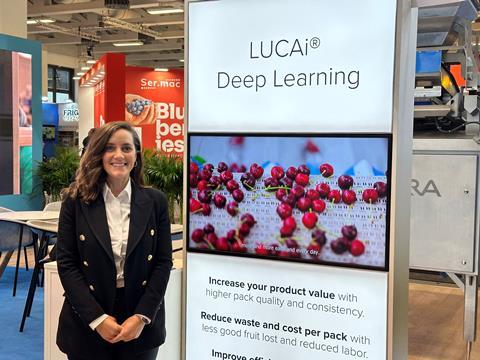New LUCAi platform for InVision2 leverages Tomra’s Deep Learning technology to add value to cherry packing

Tomra has added LUCAi Deep Learning technology to its InVision2 grading platform to help cherry packers process increasingly large volumes while maintaining high quality standards. The technology, which has already been applied successfully to blueberries and apples, uses pre-trained models to teach computers how to process data, such as complex patterns in photos, to achieve unprecedented grading precision.
According to Benedetta Ricci Iamino, global category director – cherries at Tomra Food, this represents a substantial leap forward in grading accuracy, along with enhanced pack-out returns, less food waste and higher productivity. “The LUCAi platform, in fact, allows Tomra customers to process cherries at a higher speed (15 per cent more kg per hour, per lane) while optimising defect sorting,” she says.
“It helps them to achieve higher returns per kg packed than any other technology available today, reducing their food waste, and enhancing their reputation for consistent quality in the markets. Another advantage is its new interface, which is very user-friendly, making it easy and quick for operators to adapt to the technology.”
The platform uses Tomra’s Deep Learning technology to identify edge cracks, pacman cherries (half cherries), open sutures, cosmetic blemishes and stem pulls. It also improves detection of spurs, cracks and all defects around the stem area with unparalleled accuracy.
It uses pre-trained models built on a wealth of data and knowledge collected in multiple regions across the world for the past five years. “It is important to understand that AI technology is an empty box you need to fill; without a large amount of quality data, it goes nowhere,” Ricci explains.
“That’s where LUCAi stands out from any other AI platform available in the industry: it comes with vast amounts of data that Tomra has collected, building pre-trained models using real images of cherries that our customers pack, continuously developing LUCAi’s ‘brain’, which becomes smarter and smarter in the process and consequently more powerful and precise over time. This means that it is ready ‘out of the box’, able to deliver its superior sorting and grading performance as soon as it is installed at our customers’ operation.”
Tomra’s service team can help packers build tailored models that address issues with the varieties and defects specific to their operation, so that the platform performs to meet their precise needs and quality requirements.
Tried and tested in the field
According to Ricci, a key phase in Tomra Food’s product development process is testing in the field, in real conditions with customers. “That’s exactly what we have done when extending our LUCAi Deep Learning technology to cherries: we tested and validated it in California and New Zealand, during the past two seasons, collecting more data and working with our customers to help them build models to address their specific issues,” she says.
California’s Prima Frutta Packing has been using the technology in its cherry packing operation with excellent results, Tomra says. It has enabled the company to increase production and packing efficiencies (kg per hour per person) with the same workforce, allowing them to keep up with the short cherry harvest window while maintaining the high quality of their product.
Tomra points out that this is especially valuable in a challenging season like last year’s when the cherries were about three weeks late and came to maturity all at once. The company successfully trained the system to accurately detect defects such as powdery mildew defects, insect bites and freshwater cracks after rain, which it would have found very difficult with its traditional mapping system. The user-friendly operation was another big advantage they highlighted.
Tim Sambado, president of Prima Frutta Packing, comments: “It’s really exciting to see how the system is going to evolve. I think we’ve just scratched the surface. I think there’s a lot more ahead of us”.
The LUCAi for InVision2 grading platform will be available on the market in the Southern Hemisphere for the 2024 cherry season, with other regions to follow.



